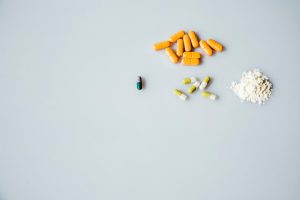Escitalopram, known as Lexapro, is a selective serotonin reuptake inhibitor (SSRI). SSRIs are typically used to treat major depressive disorder (MDD) and generalized anxiety disorder (GAD). This article discusses how Lexapro works, Lexapro for depression, and more.
Serotonin is a neurotransmitter that transmits messages between your neurons or the nerve cells in your brain. It helps you regulate your mood and is the body’s “feel good” chemical. SSRIs increase available serotonin by preventing the neurons from reabsorbing it.
Specifically, they bind with the serotonin transporter protein (SERT). Escitalopram is highly selective, making it less likely to bind to other neurotransmitters by mistake.
Increased serotonin levels in your central nervous system improve mood and help decrease the symptoms of anxiety and depression.
Does Lexapro Have Side Effects?
Like most other mental health drugs, taking Lexapro can cause side effects ranging from mild to severe. Some common side effects include:
- Dizziness
- Drowsiness, weakness, or lethargy
- Anxiety or agitation
- Tremors or increased muscle movements
- Insomnia
- Increased thirst
- Loss of appetite
- Sweating
- Dry mouth
- Constipation
- Nausea
- Vomiting
- Diarrhea
- Nosebleeds
- Heavy menstrual periods
- Decreased sex drive
Other side effects are more severe but are usually rare. Get medical attention if you develop the following:
- Vision disturbances and eye pain
- Extreme changes in mood or behavior
- Panic attacks
- Suicidal ideations or actions
- Pain or burning when you urinate
- Seizures
In rare cases, Lexapro can have the opposite of the intended effect and worsen your depression.
Speak to a doctor if your symptoms worsen or you experience new symptoms. Get emergency help if you suddenly develop suicidal urges.
Lexapro can decrease the level of sodium in your body. This may sound good, as we consistently hear how too much sodium can harm us, but your body also needs adequate sodium to function correctly.
Low sodium levels can cause headaches, vomiting, confusion, slurred speech, severe weakness, and loss of balance and coordination.
In addition, if your sodium levels drop low enough, you may experience a severe nervous system reaction that includes stiff muscles, a high fever sweating, confusion, tremors, faintness, and a fast or uneven heart rhythm.
If you experience any symptoms of sodium deficiency, call your medical expert or go to the emergency room.
As with most drugs, there is always a potential of experiencing an allergic reaction to Lexapro. The Food and Drug Administration mandates that this medication comes with a black box warning of a possible increase in suicidal urges.
If you develop a rash or hives, trouble breathing, or inflammation or swelling of your lips, face, tongue, or throat while taking Lexapro, seek emergency medical help immediately.
Drug Interactions
In general, escitalopram has minimal interactions with other drugs. However, there are some you should know.
SSRIs, including escitalopram, may increase your risk of bleeding. In addition, if you take blood thinners, including warfarin, aspirin, or other non-steroidal anti-inflammatory drugs, your risk increases even further.
Serotonin syndrome is a rare but serious medical condition that requires immediate medical attention. It occurs when high levels of serotonin build up in your body.
Symptoms may include a high fever, sweating, anxiety, agitation, restlessness, confusion, tremors, lack of coordination, a rapid heart rate, and significant blood pressure changes.
Serotonin syndrome is most common when you take more than one medication that boosts the level of serotonin in your body.
This includes other SSRIs, certain pain and headache medications, and St. John’s wort.
Be cautious about consuming alcohol when taking Lexapro. While there are no known interactions between the two substances, alcohol can increase specific side effects of Lexapro, such as sleepiness or dizziness.
Patient Acceptability
Patient acceptability refers to how likely patients are to continue therapy with a drug after the first few weeks of taking it.
Escitalopram consistently had a lower discontinuation rate within 8-27 weeks than other antidepressants.
This means that despite any potential side effects, most people taking Lexapro saw a significant enough improvement in their depression symptoms to continue taking their medication.
Who should not take Lexapro for depression?
While Lexapro is a highly effective medication for treating depression, it may not be suitable for every patient. You should talk to a healthcare expert before taking Lexapro if you:
Already take a different antidepressant
Monoamine oxidase inhibitors (MAOIs) are another class of antidepressant medication. Like SSRIs, they increase the amount of serotonin in your body.
However, taking MAOIs and Lexapro together may increase your risk of serotonin syndrome. This is why you should not take Lexapro with any other SSRIs.
Antidepressants that can interact with Lexapro include:
- Methylene blue (Provayblue)
- Linezolid (Zyvox)
- Fluoxetine (Prozac)
- Citalopram (Celexa)
- Phenelzine (Nardil)
- Isocarboxazid (Marplan)
- Sertraline (Zoloft)
- Paroxetine (Pexeva or Paxil)
- Selegiline (Emsam)
It may take some trials to find the antidepressant that works best for you. If you are trying to switch from another antidepressant to Lexapro, work with your doctor on a plan for weaning yourself off your previous medication and starting Lexapro at an appropriate time.
Are allergic to Lexapro or any of its ingredients
If you have previously gotten allergic reactions to Lexapro for depression or another medication containing the same ingredients, you will likely have another reaction.
As these reactions can be life-threatening, avoiding any drugs that might trigger one is best.
Take pimozide
Pimozide is an antipsychotic medication used to treat Tourette syndrome. When taken with Lexapro, it may increase your risk of heart problems, including an irregular heart rhythm.
Have a preexisting health condition that causes issues with blood clotting
Lexapro may heighten your risk of bleeding; if you already have a bleeding disorder like hemophilia, you may be at even higher risk. Your doctor can help you determine whether Lexapro is the proper treatment.
Have a history of seizures
Though rare, seizures can be a side effect of Lexapro. In addition, if you already have a seizure disorder like epilepsy, you may be at even greater risk.
Take diuretics or have another health condition that causes chronic dehydration
Dehydration and diuretics often cause you to lose electrolytes, including sodium. As Lexapro also affects your blood sodium levels, taking diuretics and Lexapro at the same time could lead to dangerously low sodium levels in your blood and affect your heart and nervous system.
Have existing kidney or liver problems
The kidney and liver are the body’s natural detox machine and help us appropriately metabolize medications. If these organs are damaged, you may be at a greater risk of experiencing side effects from Lexapro, especially severe ones.
Also, it is unknown if Lexapro is safe for patients with kidney failure or other severe kidney problems, so it is best to consult your doctor. They may put you on a lower dose or try an alternative therapy.
Are pregnant or breastfeeding
SSRIs may be unsafe during the last 3 months of pregnancy, as they may cause congenital disabilities.
Additionally, Lexapro can be passed to a nursing baby via breastmilk and cause side effects.
If you are expecting a newborn or trying to be pregnant while on Lexapro, speak with your doctor.
Are under 25 years of age
There is evidence that patients 25 years old and younger may be at increased risk for suicidal thoughts as a side effect of Lexapro. Also, this medication is not approved for any child under 12.
Suffer from bipolar disorder or mania
Lexapro may increase the risk of a manic or mixed episode in patients who have bipolar disorder.

How do I take Lexapro?
Lexapro should be taken at roughly the same time each day. However, if you skip a dose, use the missed dose immediately. But if it’s close to the period for your next dose, skipping a dose is better than taking 2 at once. You can take Lexapro with or without food.
If you take it in pill form, make sure you have a beverage available to help you swallow. If taking it in oral solution or liquid form, measure your dose carefully with a dosing spoon or medicine cup.
Don’t stop taking Lexapro suddenly, as you may experience withdrawal symptoms.
When you start taking Lexapro, you notice your energy level and appetite return to normal within one to two weeks, but it can wait up to 6 or 8 weeks before you see a noticeable improvement in your mood.
Can you get Lexapro (escitalopram) prescribed online?
Especially since the Covid pandemic, there has been a surge of telehealth providers in recent years. These services hire fully licensed doctors and nurse practitioners to evaluate and treat patients at any time, from anywhere.
You can schedule a telehealth appointment to get a Lexapro prescription online without leaving home.
Doctor Alexa offers affordable world-class healthcare services that patients can access from the convenience of their homes or offices.
If you are struggling with signs of depression and don’t know where to start, schedule a virtual appointment today. Click here to schedule a consultation.
Our team of licensed healthcare professionals will listen to your symptoms and concerns and recommend which treatments, including Lexapro, may be right for your health conditions.
Learn to Spot Depression: Symptoms and Warning Signs
Major depressive disorder, also called clinical depression, is a mood disorder associated with persistent sadness, withdrawal, and loss of interest.
Sadness is a regular human emotion that we will experience from time to time. However, depression is more than just being sad.
Depression symptoms occur most of the day, daily for extended periods, and interfere with your daily activities.
Symptoms of depression include:
- Feelings of sadness, emptiness, or hopelessness
- Irritability and angry outbursts
- Loss of interest or satisfaction from hobbies and activities you previously enjoyed
- Low libido, sexual dysfunction
- Social anxiety, restlessness, or agitation
- Trouble concentrating and remembering things
- Slowed thinking, speech, or movements
- Fixation with past mistakes; feelings of worthlessness and guilt
- Recurrent thoughts of death; suicidal thoughts and actions
Sneaky Triggers of Depression
Some people may never experience depression, even when faced with challenging life circumstances.
However, other people may become depressed even when everything is going well.
Depression is caused by physiological or biochemical differences in a person’s brain that affect mood regulation and make them more prone to mood disorders.
Often, these differences are genetic, but specific injuries and illnesses can also make people vulnerable to psychiatric disorders.
If you are genetically predisposed to depression, you might find that you do not experience any symptoms until something in your life triggers a depressive episode.
Common triggers include:
- Grief or loss
- Rejection
- Stress
- A prolonged physical illness
- Persistent lack of sleep
- Financial problems
- Major life transitions (such as moving, changing jobs, getting married, having a new baby, etc.)
- Substance use
Depression Myths
While stigmas and misinformation surrounding mental health are improving, many people still don’t fully understand depression. The following myths can be dangerous because they prevent people from seeking the proper treatment when they need it.
Myth #1: Depression isn’t a “real illness.”
As we just talked about, scientists can prove that the brains of depressed people are physically and chemically different from those of people who don’t have depression.
The brain is an organ; typically, like any other human organ, it can malfunction. Depression is a complex mental illness, not a character flaw.
Myth #2: You just need a better attitude.
Again, depression is an actual medical condition, not a choice. No one can change their brain’s chemistry or structure just by thinking positively.
While talk therapy can help many people learn coping techniques for dealing with depression, it is still a chronic illness that many people require medication to manage effectively.
Myth #3: Depression is always caused by something terrible happening to a person
While things like the demise of a loved one or the loss of a livelihood can trigger a depressive episode in someone already vulnerable, other people may experience depression seemingly out of nowhere or even after something good happens in their life.
Myth #4: Antidepressant medications change your personality
Many people, especially Young adults, are nervous about the fact that antidepressants alter your brain chemistry and may worry that these medications will cause them to act like a completely different person.
However, most people taking antidepressants report feeling more like themselves after starting the medication. Antidepressants target very specific chemicals and do not affect your underlying personality.
Physical Symptoms
Although depression is a mental well-being issue, it can also be accompanied by physical symptoms, including:
- Sleep challenges, such as insomnia or sleeping too much
- Fatigue and tiredness
- Reduced appetite and weight loss
- Food cravings and weight gain
- Digestive issues
- Unexplained aches and pains, including headaches or back pain
Frequently Asked Questions (FAQs)
During your first week of taking Lexapro, you may experience adverse effects like an upset stomach, headache, fatigue, or trouble sleeping. Generally, these symptoms improve as your body becomes used to the medication. Within a few weeks, you will notice your depression symptoms improving. You will have more energy, a better appetite, and reduced feelings of sadness, emptiness, and anxiousness. Most people report that they feel more like themselves after they start taking Lexapro.
Within the first one to two weeks of taking Lexapro for depression, you will notice an improvement in your physical symptoms. For example, you will start sleeping better, have a better appetite, and have more energy. However, it may take up to 6 or 8 weeks to notice a significant change in your mood.
While Lexapro is designed to work as an antidepressant, it is also very effective at treating generalized anxiety disorder (GAD).





